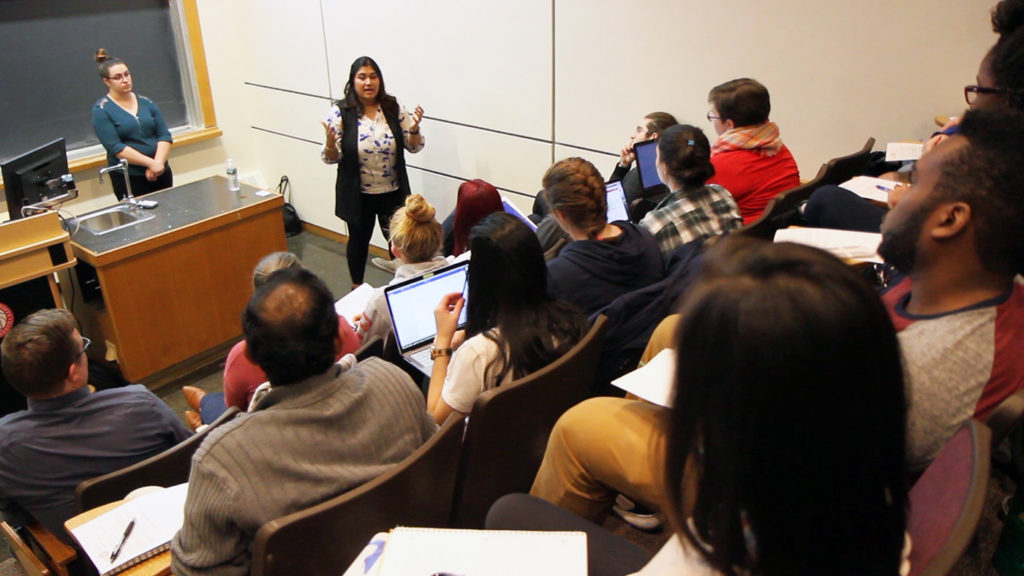10 tips for landing a job in the sciences

There’s no doubt that careers in STEM (Science, Technology, Engineering, and Math) fields are booming, and especially in Massachusetts, a leader in biotechnology. But if you’re a college student majoring in the sciences, it’s not always easy to know how to land your first job.
Donald Spratt, assistant professor of chemistry and biochemistry at Clark University, designed a new course to help his students do just that. Called LEEPing into a Science Career — the title is a nod to Clark’s undergraduate curriculum, Liberal Arts and Effective Practice (LEEP) — the class provides students majoring in biochemistry and molecular biology, biology, and chemistry, with ways to successfully navigate the job market.
“I saw a lot of students concerned about finding jobs after leaving Clark, and I thought it would be a great opportunity to get everybody in the same room, inviting guest speakers, some of them former Clarkies, to talk about how they found their jobs,” says Spratt.
The guest speakers in the weekly class range from the president of a technology company to a pharmaceutical sales representative to a headhunter identifying job candidates for STEM employers. Among their topics: networking, setting up informational interviews, writing cover letters and résumés, identifying potential jobs, selling yourself in job interviews, and negotiating salaries and benefits.

Spratt also weighs in with advice on “life issues” that not all 20-somethings have experienced, like building credit, negotiating the best deal for a car, saving for retirement, buying life insurance, balancing career and family, and creating a five-year life and career plan.
“One of the major goals of my course,” Spratt says, “is that I want students leaving Clark to be confident and recognize that all the skills, trials, and tribulations they’ve gone through will help them be stronger and more employable.”
In a recent class, two Clark alumni — Liz Nelson ’16, M.S.’17, a scientific recruiter at Commonwealth Sciences Inc., and Kshama Worth ’03, a product sales specialist with GE Healthcare, who obtained a doctorate in biomedical science from UMass Medical School — shared these tips for landing a job in the sciences:
- Network, network, network. “It’s not what you know; it’s who you know. That’s still true,” Worth said. She advised students to check out BioExchange and Women in the Enterprise of Science, and Technology (WEST), follow such organizations on LinkedIn, and participate in conversations. Attend their social events, she said, and use these as opportunities for informational interviews.
- Talk to everyone, even diners at the next table. “Everyone you meet is a potential contact,” Worth said or at least someone who can help you practice “small talk” with people you don’t know. This will come in handy for job interviews, she noted, where you’re being tested not only for what you know and can do, but how you might interact with others and fit into a company culture.
- Build your professional brand. That means cleaning up your online image. Also, post and share articles on LinkedIn. “The first thing I do when I get a résumé, I go online to check out the applicant’s online image on LinkedIn and Google,” Worth said.
- Start applying for jobs early, but not too early. If you’re graduating in May, start applying in March.
- In a job interview, ask questions. “Be just as critical as they are with you,” Nelson said. After your interview, thank all the people you’ve met. Follow up by sending them invites on LinkedIn.
- Ask for a higher salary. Think of it this way: If you don’t ask, you don’t get it, Professor Spratt said. Nelson added this special note for women: “Women tend to negotiate less than men do; keep in mind that if you’re starting your career at less, you’re setting yourself up to stay there.”
- Negotiate your start date, and take time out to enjoy your life. Graduating from school or leaving a job? Don’t jump into your next job; take that road trip you’ve always envisioned, or take time to connect with friends and family. “You definitely have the power to call the human resources department and negotiate your start date,” Nelson explained.
- Before you sign your offer letter, make sure you understand everything about your salary, title, vacation, benefits, company structure, room for advancement, and more. If you don’t, ask questions.
- Have a career plan during and after college, but be flexible. Adjust as you go along. “Be open-minded, and step out of your comfort zone,” Worth advised. Consider this: Most science majors do not end up in academic careers. “Going the academic route — getting a post-doc and becoming a professor — is the alternative career,” she said. “The truth is, most people in the sciences are doing something else.”
STEM graduates, with or without a Ph.D., work in a variety of jobs, as application scientists, science writers, recruiters, technical support professionals, project managers, software developers, technology application trainers, and in sales, marketing, information technology, government, and more.
“There’s a whole world of opportunities out there; you just don’t know about it yet,” Worth said. - And No. 10? Professor Spratt closed the class by reminding students about one of his top tips: “Be nice. The science world is small.”


